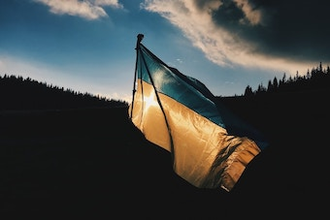Ian Linden: The search for a just peace in Ukraine

Photo by Max Kukurudziak on Unsplash
'Among the calamities of war may be jointly numbered the diminution of the love of truth by falsehoods which interest dictates and credulity encourages'.
That's Samuel Johnson in November 1758 writing in his The Idler essays for the London Weekly about the growing role of journalists - 'news-writers'. You wonder what he might have made of Putin's news media.
'The first casualty of war is truth', our terse twentieth century version of Johnson. The aphorism applies to the coverage of the war in Ukraine both through what is generally omitted, what is told and untold.
The ethical principles underlying journalism are accuracy, impartiality, independence, accountability, humanity and truth. They are notoriously difficult to abide by - sometimes career-threatening - in the face of strong public opinion, particularly during war when a degree of self-censorship is prudent.
Take just two examples of Western reporting. The Russians claimed they were promised in the 1990s that NATO would not expand eastwards. Denials were reported uncritically. But US National Security Archives opened in December 2017 reveal Gorbachev was indeed assured in 1990-1991, not only by US Secretary of State, James Baker, but by Thatcher, Kohl, Mitterrand, Major and Bush senior that there would be no NATO expansion. This litany of assurances - Baker's "not one inch east" - came as quid pro quo for Gorbachev's consenting to German unification within NATO. Promises to Russia were reneged on in response to understandable pressures from Central and Eastern European countries plus lobbying by the six major US armaments corporations led by Lockheed Martin. In 1996, Congress passed legislation enabling expansion, the NATO Enlargement Facilitation Act.
The former ambassador to the Soviet Union and doyen of foreign policy within the State Department, George Kennan wrote in the 29 June 1997 New York Times with extraordinary prescience: "Expanding NATO would be the most fateful error of American policy in the entire post-Cold War era. Such a decision may be expected to inflame the nationalistic, anti-Western and militaristic tendencies in Russian opinion; to have an adverse effect on the development of Russian democracy; to restore the atmosphere of the cold war to East-West relations, and to impel Russian foreign policy in directions decidedly not to our liking". As Putin was consolidating his power between 1999-2004, ten countries, four bordering Russia, joined NATO.
NATO's expansion does not justify Putin's criminal invasions of Ukraine nor his war crimes, nor his tyrannical rule. But it does provide him with a public rationale for attacks on his southern, sovereign neighbour (his imperial fantasies seem to have taken over now). As long as acknowledging the truth of what Kennan wrote back in 1997 about NATO expansion incurs strident media accusations of supporting Russian aggression, we are not going to learn from history - though perhaps we never do.
The second example of constrained reporting has profound implications for ending the war through a peace agreement and ceasefire. Russia's fantasy of blitzkrieg and swift overthrow of Ukraine's pro-western government failed. In March 2022, a month after the invasion, as a result of Turkish mediation, Russia and Ukraine appeared on the verge of finding a negotiated end to the fighting. Key elements were Russia's withdrawal to its pre-24 February positions in exchange for Ukraine's neutrality, that is excluding any foreign bases or troops from its territory - even on joint exercises. The US, UK and other countries were to provide joint security guarantees promising to intervene in the event of Ukraine being attacked again. Crimea would be left on the back burner with an understanding that within the next fifteen-years, while seeking a resolution, neither party would use military means to change the territory's current status. The disputed Donbass area would also be the subject of separate negotiations.
To read on see: www.ianlinden.com/latest-blogs/the-search-for-a-just-peace-in-ukraine
Professor Ian Linden is Visiting Professor at St Mary's University, Strawberry Hill, London. A past director of the Catholic Institute for International Relations, he was awarded a CMG for his work for human rights in 2000. He has also been an adviser on Europe and Justice and Peace issues to the Department of International Affairs of the Catholic Bishops Conference of England and Wales. Ian chairs a new charity for After-school schooling in Beirut for Syrian refugees and Lebanese kids in danger of dropping out partnering with CARITAS Lebanon and work on board of Las Casas Institute in Oxford with Richard Finn OP. His latest book was Global Catholicism published by Hurst in 2009.


















